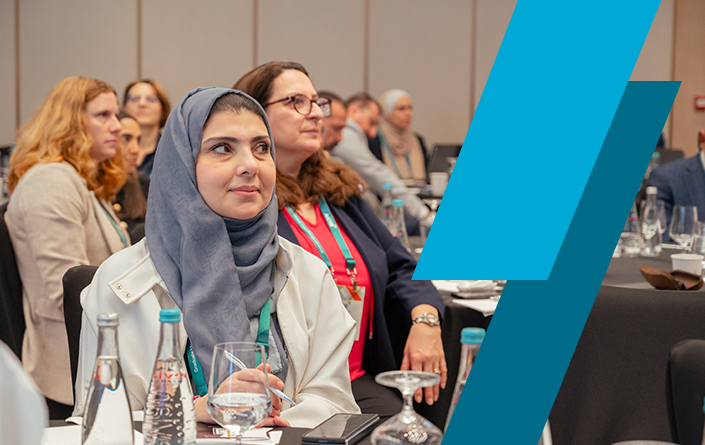ICYMI: DEIB Initiatives, Ideas, and Insights
- Educators highlight practices that address gender-based inequities, such as promoting alliances among women, diversifying cases, and adopting gender budgeting.
- Several business schools detail their initiatives designed to support students with disabilities, Indigenous students, and refugee populations.
- Administrators explain how they crafted and deployed schoolwide initiatives, while two other educators debunk myths that hinder such progress.
This month, AACSB Insights has published content tackling a range of issues pertaining to diversity, equity, inclusion, and belonging (DEIB). These include a piece by an author from Fordham University describing a new business school initiative to improve the pipeline of diverse students to its programs, as well as a video in which two educators discuss the importance of leveraging technology to promote equity.
Other articles from this month’s lineup look at serving the neurodivergent community and helping students cultivate empathy. In addition, we provide highlights from discussions that took place at AACSB’s DEIB Conference, held in May. These session topics focused on cultivating cultures of empathy and inclusivity, implementing diversity initiatives effectively, and partnering with LGBTQ+ leaders to promote inclusivity in ways that resonate with non-Western audiences.
As June comes to an end, we thought we would look back at content on DEIB that we have featured in past editions of AACSB Insights. In case you missed them, here are 25 articles, spanning seven different subtopics, that might be helpful for your school’s next DEIB discussions and initiatives:
Achieving Gender Equity
- “The Equalizing Power of Sisterhood” (March 2023)—Beth Livingston and Tina Opie argue that stronger alliances among women could address gender inequities.
- “How Gender Budgeting Promotes Equity” (July 2022)—Here’s what happened when Birmingham Business School embraced gender budgeting, a process in which it analyzed the makeup and workloads of its faculty to identify and address disparities.
- “Gender Diversifying the Business Curriculum” (September 2020)—Gary Fraser and Ruchi Watson explore why teaching more gender-diverse cases is so important—and how every business school can achieve that goal.
- “Leadership Barriers for Women in Higher Education” (December 2018)—Susan Bartel unpacks the stereotypes and biases that impact women pursuing careers in higher education and outlines five ways schools can increase the number of women holding leadership positions.
Promoting Inclusivity
- “Welcoming Equity-Deserving Students” (December 2022)—The Smith School of Business at Queen’s University launches its Equity Diversity Inclusion Indigenization Internship Program, or EDI3, to provide mentorship, professional development, and internship opportunities to students from underrepresented groups.
- “What Factor Is Key to Enabling Student Learning?” (September 2022)—Wendy Smith and Anu Sivaraman discuss the critical role that inclusivity plays in students’ ability to learn.
- “Building an Inclusive Community” (April 2022)—A new associate dean at the Villanova School of Business is tasked with fostering a more inclusive and welcoming campus culture.
- “The Inclusive Curriculum” (February 2020)—Joanna Garcia shares how she has adjusted materials in her accounting classroom to be more inclusive of more diverse perspectives.
Supporting Students With Disabilities
- “Advancing Accessibility in Higher Education” (June 2022)—A look at how universities around the world have created inclusive environments for students with disabilities.
- “Welcoming Neurodiversity in the Workplace” (December 2021)—Philanthropist K. Lisa Yang talks about why it’s so important to improve employment prospects for people with invisible disabilities.
- “Mastering the Art of Accessibility” (November 2021)—Amy C. Lewis and D’Lisa N. McKee discuss the importance of removing barriers to education for everyone, regardless of ability.
Meeting Needs in Local Communities
- “Fulfilling the Potential of a Partnership” (December 2022)—Dalton State College works with the Latin American Association to assess the well-being and needs of the local Hispanic population.
- “Creating Impact With Research and Outreach” (April 2022)—Liverpool John Moores University works to improve educational outcomes for the local Roma community through its Roma Education Aspiration Project, or REAP.
- “Creating a Path for Refugees” (November 2021)—Deakin Business School in Australia sponsors a center to help highly skilled refugees obtain meaningful employment.
Working With Indigenous Populations
- “How to Attract More Native American Students” (July 2022)—Three educators offer their recommendations for increasing the number of Native American students, faculty, and administrators in business schools.
- “Bringing Business Education to Indigenous People” (December 2021)—Queen’s University partners with Spalyan Education Group to deliver training to all six Indigenous communities of the Tŝilhqot’in Nation in British Columbia.
- “Extreme Local Impact” (January 2019)—A professor shares his lessons learned after he spent time with Inuit entrepreneurs in the Arctic North.
Integrating DEIB Into the Curriculum
- “Achieving Diversity Through Equity Analytics” (April 2022)—A course at the University of Michigan’s Ross School of Business teaches students to take analytical approaches to discovering the causes of disparities.
- “Choosing Action Over Words in DEI Efforts” (April 2022)—Emory University’s Goizueta Business School adds a DEI concentration for MBAs interested in learning more about the value of DEI in the workplace.
- “Eliminating Barriers to Business Education” (December 2021)—Ascend, a program at Boston University’s Questrom School of Business, organizes its student-focused DEI clubs, support, and programming, including the Ascend Fellows program that provides support to undergraduates from underrepresented backgrounds.
- “Our World Needs Empathetic Intervention—Not Heroes” (December 2020)—Ncedisa Nkoyueni and Cynthia Rayner emphasize the importance of diversifying perspectives in teaching cases and emphasizing interconnections between people to open the door to greater empathy and understanding.
Designing Effective DEIB Policies
- “Tackling Diversity Along Many Dimensions” (July 2022)—A faculty-led initiative at the University of Maine Business School results in the crafting of a new statement of commitment to DEI and the creation of a website and events addressing DEI issues.
- “To See Change, Business Schools Must Model Change” (June 2021)—Post University’s Baldrige School of Business improved its diversity measures by reexamining its hiring practices, revamping its curriculum, diversifying its case studies, and seeking out student input.
- “Myths of the Diversity Dilemma” (June 2021)—Jenny M. Hoobler and Alexis Washington highlight four common myths that keep business schools from seeking out faculty from underrepresented groups, including the belief that pipeline issues, not policies, are what hinder diversity.
- “Mitigating Bias on Institutional Search Committees” (June 2018)—A consultant with the search firm Spelman Johnson offers 10 ways that search committees can address unconscious bias.
Let’s Continue the Conversation
The articles highlighted above reflect DEIB’s continuing evolution on campuses and in communities worldwide, and we would like to continue the conversation! Please share your ideas, experiences, challenges, and observations about DEIB, either with us at AACSB Insights or with colleagues on AACSB Exchange forums.






